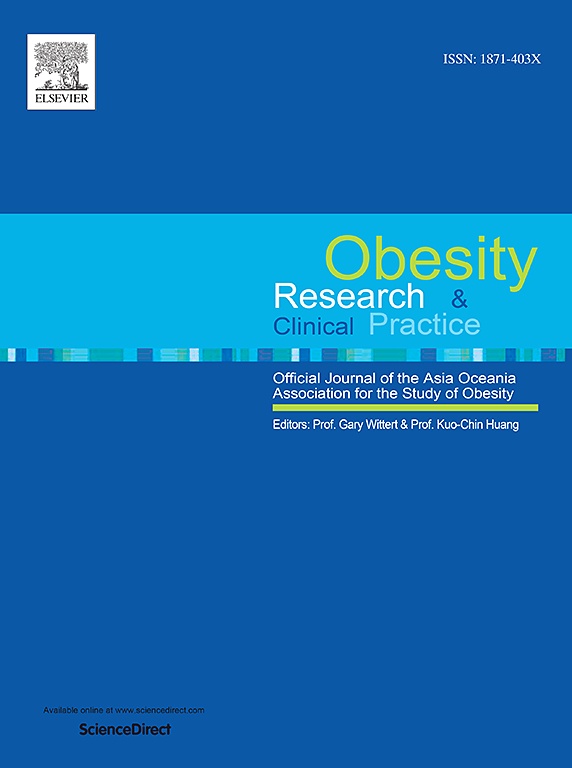质疑食物成瘾在儿童肥胖中的作用:评论An等人(2025)。
IF 2.5
4区 医学
Q3 ENDOCRINOLOGY & METABOLISM
引用次数: 0
摘要
An et al. (2025) b[1]的研究调查了韩国超重或肥胖儿童和青少年中食物成瘾(FA)、肥胖以及情绪和行为问题之间的关系。虽然FA与较高的BMI、较低的自尊和增加的情绪困难有关,但关键的方法局限性挑战了这些发现的临床相关性。横断面设计需要仔细控制混杂变量,但遗传易感性、社会经济地位、食物环境和家庭动态等基本因素没有得到充分解决。此外,Dos Anjos等人(2021)的研究表明,新食物恐惧症等行为特征会影响儿童的不健康饮食模式,以及神经发育状况,如多动症和自闭症谱系障碍,经常与饮食行为失调同时发生,可能会混淆FA分类。Nyholmer等人(2024)的最新数据进一步强调了限制性饮食与精神合并症之间的重叠,强调了全面评估的必要性。该研究缺乏饮食模式分析,特别是关于超加工食品摄入的分析,以及饮食报告中缺乏年龄分层的可靠性,限制了其可解释性。未来的研究应该整合神经发育和精神病学评估,以澄清FA是否反映了儿童肥胖中独特的临床实体或更广泛的情绪和行为失调。没有这一点,FA作为一个孤立结构的应用仍然值得怀疑。本文章由计算机程序翻译,如有差异,请以英文原文为准。
Questioning the role of food addiction in pediatric obesity: Comment on An et al. (2025)
The study by An et al. (2025) [1] investigated the association between food addiction (FA), obesity, and emotional and behavioral problems in Korean children and adolescents with overweight or obesity. While FA was linked to higher BMI, lower self-esteem, and increased emotional difficulties, critical methodological limitations challenge the clinical relevance of these findings. Cross-sectional designs require careful control of confounding variables, yet essential factors such as genetic predispositions, socioeconomic status, food environment, and family dynamics were not fully addressed. Additionally, behavioral traits like food neophobia, shown by Dos Anjos et al. (2021) [9] to influence unhealthy eating patterns in children, and neurodevelopmental conditions, such as ADHD and autism spectrum disorder, frequently co-occur with disordered eating behaviors and may confound FA classifications. Recent data from Nyholmer et al. (2024) [15] further highlight the overlap between restrictive eating profiles and psychiatric comorbidities, underscoring the need for comprehensive assessment. The study's lack of dietary pattern analysis, particularly concerning ultra-processed food intake, and absence of age-stratified reliability in dietary reporting limit its interpretability. Future research should integrate neurodevelopmental and psychiatric evaluations to clarify whether FA reflects a distinct clinical entity or broader emotional and behavioral dysregulation within pediatric obesity. Without this, the application of FA as an isolated construct remains questionable.
求助全文
通过发布文献求助,成功后即可免费获取论文全文。
去求助
来源期刊

Obesity research & clinical practice
医学-内分泌学与代谢
CiteScore
7.10
自引率
0.00%
发文量
80
审稿时长
49 days
期刊介绍:
The aim of Obesity Research & Clinical Practice (ORCP) is to publish high quality clinical and basic research relating to the epidemiology, mechanism, complications and treatment of obesity and the complication of obesity. Studies relating to the Asia Oceania region are particularly welcome, given the increasing burden of obesity in Asia Pacific, compounded by specific regional population-based and genetic issues, and the devastating personal and economic consequences. The journal aims to expose health care practitioners, clinical researchers, basic scientists, epidemiologists, and public health officials in the region to all areas of obesity research and practice. In addition to original research the ORCP publishes reviews, patient reports, short communications, and letters to the editor (including comments on published papers). The proceedings and abstracts of the Annual Meeting of the Asia Oceania Association for the Study of Obesity is published as a supplement each year.
 求助内容:
求助内容: 应助结果提醒方式:
应助结果提醒方式:


